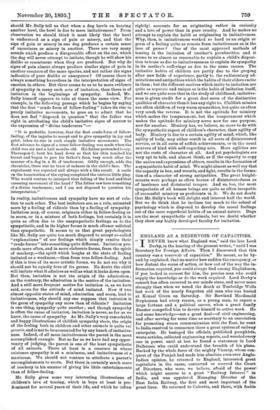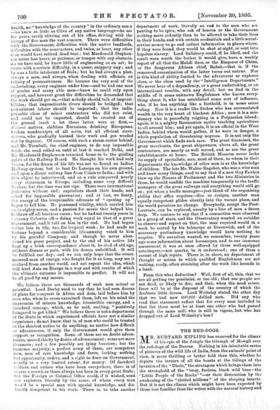ENGLAND AS A RESERVOIR OF CAPACITIES.
" INEVER knew what England was," said the late Lord Derby, in the hearing of the present writer, "until [was Secretary for Foreign Affairs. Then I discovered that this country was a reservoir of capacities." He meant, as he by- and-by explained, that no matter how sudden the emergency, or how distant the scene of action, or how out of the way the in- formation required, you could always find among Englishmen, if you looked in earnest for him, the precise man who could supply the knowledge or do the work required. Lord Derby's remark has often recurred to our minds since, and never more strongly than when we noted the death at Tunbridge Wells last week of the nearly forgotten old man who was buried at Kensal Green on Saturday. Sir Rowland Macdonald Stephenson had every reason, as a young man, to expect a large fortune and a political career, when a great family disaster compelled him to devote himself to active work. He had some knowledge—not a great deal—of civil engineering, and after serving for some time as secretary to an association for promoting steam communication with the East, he went to India resolved to commence there a great system of railway enterprise. He besieged the officials, published pamphlets, wrote articles, collected engineering reports, and worried every one in power, until at last he found a statesman in Lord Dalhousie who could understand the breadth of his plans. Backed by the whole force of the mighty Viceroy, whose con- quest of the Punjab had made him absolute even over Anglo- Indian opinion, he returned to England, interested great capitalists in the cause, converted or coerced the Court of Directors, who were, we believe, afraid of the power'' which might accrete to a great "Railway Interest" in India, and was appointed Managing Director of the East India Railway, the first and most important of the great lines. He returned to Calcutta, and there, with feeble health, no "knowledge of the country" in the ordinary Bente —be knew as little as Clive of any native language—be sat for years, rarely stirring out of his office, driving with the energy of five men the vast concern. There were difficulties with the Government, difficulties with the native landlords, diEculties with the contractors, and twice, at least, any other man would have retired dead-beat ; but Macdonald Stephen- on never never lost heart, or patience, or temper with any obstacle. As we have said, he knew little of engineering as an art ; he ,vrote with a certain difficulty, in a queer, snippety way ; and he was a little intolerant of fools; but he had always a plan, always a man, and always, when dealing with officials, an infinity of persuasiveness. He became the very soul of the undertaking, every engineer under him—and he had one man of genius and many able men—knew he could rely upon support, and however great the difficulties he demanded that the work should get on,—that nobody should talk of impossi- bilities; that impracticable rivers should be bridged; that non-existent labour should be imported ; that the indis- pensable class of minor contractors who did not exist, and could not be imported, should be created out of ike ground (such a lot these latter were at first, — dci.elasse natives, shiftless Eurasians, drinking Europeans, broken nondescripts of all sorts, but all efficient slave- drivers, who gradually learned their work and got weeded oat by degrees). Of course, with such a steam-motor behind, and Mr. Turnbull, the chief engineer, to do any impossible work, the road rolled on until at last it reached Delhi, and Sir Macdonald Stephenson returned home to be the guiding spirit of the Railway Board. He thought his work had only 'begun, for the dream of his life was not to found an Indian Railway system, but to beat De Lesseps on his own ground, and open a direct railway line from Calais to India ; and with this object he interviewed, and as a rule conquered nearly very statesman in Europe, including some very difficult Pashas; but the time was not ripe. There were international jealousies without end ; capitalists shook their heads, and asked for impossible guarantees ; and at last, we fancy, the energy of the irrepressible advocate of "opening up" began to fail him. He possessed vitality, which carried him Li t3 eighty-seven, and a passion for music that helped him to throw off all business cares ; but he had sat twenty years in steamy Calcutta offi:e doing work equal to that of a great Government, and it told on him in the end. He had begun rather late in life, too, for tropical work ; he had made no fortune beyond a considerable life-annuity voted to him by his grateful Company, and though he never aban- doned his great project, and to the end of his active life kept up a brisk correspondence about it, he died of old age, without disease or pain, with his dream unfulfilled. It will he fulfilled one day ; and we can only hope that the sweet. natured man of energy, who fought for it so long, may see it realised from another world, and not repent the idea, which will hurl Asia on Europe in a way and with results of which the ultimate outcome is impossible to predict. It will not be all good by any means.
We believe there are thousands of such men actual or potential. Lord Derby used to say that he had seen dozens of plans for conquest in Africa and Asia, laid before him by men who, when he cross-examined them, left on his mind the impression of minute knowledge, irresistible energy, and a daredevil courage, which, as he said, smiling, "positively hungered to get killed." We believe there is not a department of the State in which experienced officials have not a similar sperience ; do not know, that is, of men who could be trusted at the shortest notice to do anything, no matter how difficult or adventurous, if only the Government would give them support or recognition. Some of them are no doubt adven- turers, moved chiefly by desire of advancement ; some are mere dreamers ; and a few possibly are lying boasters ; but the immense majority, a perfect army of them, are competent men, men of rare knowledge and force, lacking nothing but opportunity, orders, and a right to draw on Government, usually to a very limited extent, for money. Of daredevil ,Idiers and sailors who have been everywhere, there is of ( curse a crowd, as there always has been in every great State ; hut the Foreign or Colonial Office could, if it wished, send out explorers literally by the score, of whom every man weu'd be a special man with special knowledge, and dis- tinctly competent to his work. There is, to take another
department of work, literally no end to the men who arc panting to be spies, who ask of heaven or the Government nothing more ardently than to be allowed to take their lives in their hands, and with certain credentials and a little secret. service money to go and collect information in places where, if they were found, they would be shot at sight, or sent into hopeless slavery. Lord Salisbury could, if be liked, and the result were worth the bother it would give, have a weekly report of all that the Mahdi does, or the Emperor of China, or the dangerous African chief, Rabat,—that is, if the rumoured assassination of the latter turns out untrue. Nor is this kind of ability limited to the adventurer or explorer class, or the class used by the "Intelligence Departments." We never hear of a dependency, or a great undertaking, or an international trouble, with any detail, but we find in the middle of it some unknown Englishman who knows every- thing about it, who has established some sort of influence, who, if he has anything like a foothold, is in some sense ruling. Now it is a trader like Stokes who has accumulated wealth in the very heart of blackest Africa ; now it is a mis- sionary who is peacefully reigning in a Polynesian island ; again, it is a mighty Roumanian squire teaching agriculture to all around him ; and yet again, it is an official in the West Indies, behind whom would gather, if he were in danger, a whole population of threatening negroes. It is not only the Government which finds such men. The great financiers, the great merchants, the great shipowners, above all, the great contractors, are nearly as well served, and so are the great establishments at home. The British Museum never lacks its supply of specialists, men, most of them, to whom in their departments the knowledge of other men is as the knowledge of children. The late Mr. Walter Bagehot, who was a wise man and knew many things, used to say that if a new Guy Fawkes blew up the Houses of Parliament and the two Ministries in them, he would confide the machine temporarily to the traffic managers of the great railways and everything would still go on ; yet when a traffic manager—just think of the organising ability that office requires—dies or resigns, another man equally competent glides silently into the vacant place, and the world perceives no change. Everybody, except the Poet- Laureate, can be replaced, usually by a line of men a dozen deep. We venture to say that if a commotion were observed in a group of stars, and the Observatory wanted an outsider to observe and report on that, the man required would in a week be seated by his telescope at Greenwich, and of the necessary preliminary knowledge would have nothing to acquire. We ourselves wanted, we remember, twenty years ago some information about horoscopes, and to our immense amusement it was at once offered by three well-equipped astrologers,—not quacks, be it understood ; one of them a savant of high repute. There is, in short, no department of thought or action in which qualified Englishmen are not waiting, ready, often straining after the work like hounds in a leash.
From this what deduction? Well, first of all, this, that we are all getting too pessimist, or too old ; that our people are not dead, or likely to die; and that, when the need arises, force will be at the disposal of the country of which the doubters little dream. Lord Wolseley stated the other day that we had now 600.000 drilled men. Did any who read that statement reflect that for every man included in that list there must be at least one other who had passed through the same mill, who is still in vigour, but who has dropped out of Lord Wolseley's ken?











































 Previous page
Previous page